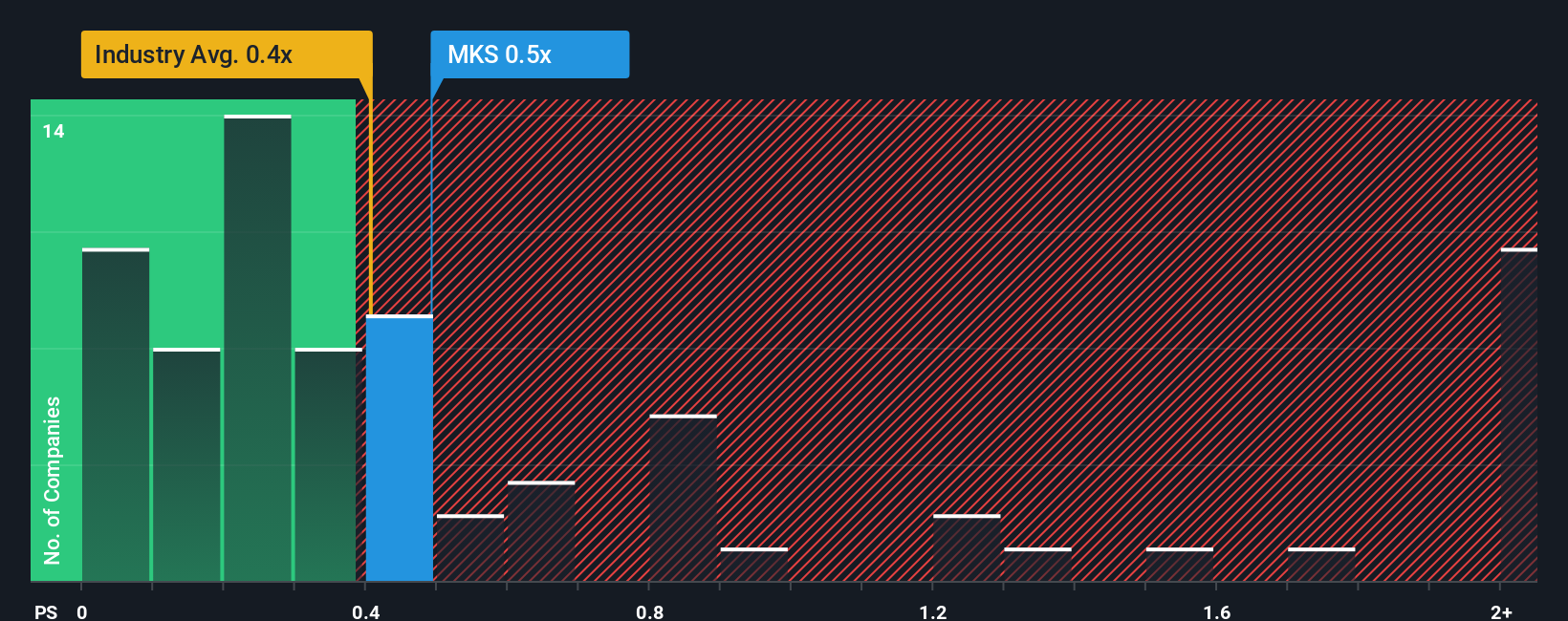Market Participants Recognise Marks and Spencer Group plc's (LON:MKS) Revenues
There wouldn't be many who think Marks and Spencer Group plc's (LON:MKS) price-to-sales (or "P/S") ratio of 0.5x is worth a mention when the median P/S for the Consumer Retailing industry in the United Kingdom is similar at about 0.4x. However, investors might be overlooking a clear opportunity or potential setback if there is no rational basis for the P/S.
See our latest analysis for Marks and Spencer Group

How Has Marks and Spencer Group Performed Recently?
Recent revenue growth for Marks and Spencer Group has been in line with the industry. It seems that many are expecting the mediocre revenue performance to persist, which has held the P/S ratio back. If you like the company, you'd be hoping this can at least be maintained so that you could pick up some stock while it's not quite in favour.
Keen to find out how analysts think Marks and Spencer Group's future stacks up against the industry? In that case, our free report is a great place to start.Do Revenue Forecasts Match The P/S Ratio?
The only time you'd be comfortable seeing a P/S like Marks and Spencer Group's is when the company's growth is tracking the industry closely.
If we review the last year of revenue growth, the company posted a worthy increase of 14%. Pleasingly, revenue has also lifted 35% in aggregate from three years ago, partly thanks to the last 12 months of growth. Therefore, it's fair to say the revenue growth recently has been superb for the company.
Looking ahead now, revenue is anticipated to climb by 2.3% per year during the coming three years according to the twelve analysts following the company. With the industry predicted to deliver 2.7% growth each year, the company is positioned for a comparable revenue result.
With this in mind, it makes sense that Marks and Spencer Group's P/S is closely matching its industry peers. Apparently shareholders are comfortable to simply hold on while the company is keeping a low profile.
The Final Word
Generally, our preference is to limit the use of the price-to-sales ratio to establishing what the market thinks about the overall health of a company.
We've seen that Marks and Spencer Group maintains an adequate P/S seeing as its revenue growth figures match the rest of the industry. At this stage investors feel the potential for an improvement or deterioration in revenue isn't great enough to push P/S in a higher or lower direction. If all things remain constant, the possibility of a drastic share price movement remains fairly remote.
Before you settle on your opinion, we've discovered 2 warning signs for Marks and Spencer Group that you should be aware of.
Of course, profitable companies with a history of great earnings growth are generally safer bets. So you may wish to see this free collection of other companies that have reasonable P/E ratios and have grown earnings strongly.
New: Manage All Your Stock Portfolios in One Place
We've created the ultimate portfolio companion for stock investors, and it's free.
• Connect an unlimited number of Portfolios and see your total in one currency
• Be alerted to new Warning Signs or Risks via email or mobile
• Track the Fair Value of your stocks
Have feedback on this article? Concerned about the content? Get in touch with us directly. Alternatively, email editorial-team (at) simplywallst.com.
This article by Simply Wall St is general in nature. We provide commentary based on historical data and analyst forecasts only using an unbiased methodology and our articles are not intended to be financial advice. It does not constitute a recommendation to buy or sell any stock, and does not take account of your objectives, or your financial situation. We aim to bring you long-term focused analysis driven by fundamental data. Note that our analysis may not factor in the latest price-sensitive company announcements or qualitative material. Simply Wall St has no position in any stocks mentioned.
About LSE:MKS
Good value with adequate balance sheet.
Similar Companies
Market Insights
Community Narratives



